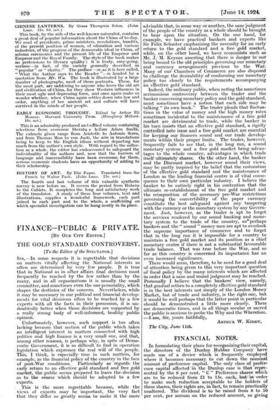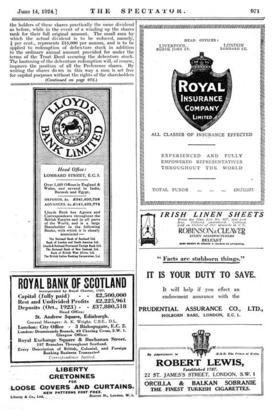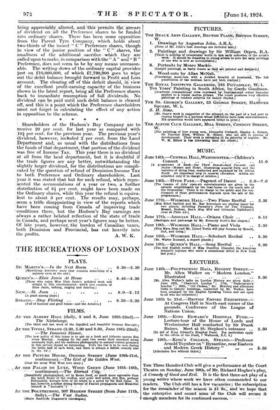FINANCIAL NOTES..
In formulating their plans for reorganizing their capital, the directors of the Dunlop Rubber Company have made use of a device which is frequently employed where it becomes \ necessary to cut down the nominal amount of preference capital. The only class of prefer.; ence capital affected-in the Dunlop case is that repre- sented by the 8 per cent. " C " Preference shares which are to be reduced from 11 to 15s. each, but in order to make such reduction acceptable to the holders of these shares, their rights are, in fact, to remain practically unaltered. The 'dividend is to be raised from 8 to 10 per cent, per annum on the reduced amount, so giving the holders of these shares practically the same dividend as before, while in the event of a winding up the shares rank for their full original amount. The small sum by which the actual dividend is to be reduced, namely, I per cent., represents 115,000 per annum, and is to be applied to redemption of debenture stock in addition to the ordinary annual amount provided for under the terms of the Trust Deed securing the debenture stock. T11.,e hastening of the debenture redemption will, of course, improve the position of all the Preference shares. By writing the shares do wn in this way a sum is set free for capital purposes without the rights of the shareholders (Continued on page 972.) 41)131"eci4b-IY.Alteted, slia.:AW-perrifits tjeirrears of dividend on all the Preference shares to be funded into ordinary ;shares. There has been some opposition from the Parent Tyre Company, which holds about two-thirds of the issued " C ' Preference shares, though in view of the junior position of the " C " shares, the Smallness of the additional sacrifice -which they are ' called upon to make, in comparison with the " A " and " B " -Preference, does not seem to be by any means unreason- able. The writing down of the-ordinary capital provides lust on £10,000,000, of which £7,730,1300 goes to wipe out tht3'.debit balance brought forward in. Profit and Loss account. The clearing off of this deficit should, in view of the excellent profit-earning capacity of the business shown in the latest report, bring all the Preference -shares back to imniediate resumption of full dividendi. No dividend can- be paid until such debit balance is cleared Off, and this is a point which the Preference shareholders Must not forget in Calculating the effect of any action in Opposition to the scheme.
* • * * * Shareholders of the Hudson's Bay Company are to -receive 20 per cent, for last year as compared with 194 per cent, for the previous year. The previous: year's dividend, however, included 2 per cent, from the Land Department and, as usual with the distribution's from :the funds of that department, that portion of the dividend was free of Income Tax. This year there is no dividend at all from the land department, but it is doubtful if -the trade figures are any better, notwithstanding the slightly larger dividend, for the distributions are compli- cated by the question of-refund of Dominion income Tax to both Preference and Ordinary shareholders. Last • year it was stated that but for such refund, which repre- ,Sented the accumulations of a year or two, a further distribution of 81 per cent. might have been made on the Ordinary shares, While this year the refund is equival • lent to about 3 per cent. The results may, perhaps, ,seem a trifle disappointing in view of the reports- which • haVe been Coming from Canada of improving trade -conditions there, but the Hudson's Bay earnings are always a rather belated reflection of the state of trade in Canada, and perhaps next year's figures may be better. Of late years, however, the burden of Canadian taxes, both Dominion and Provincial, has cut heavily into












































 Previous page
Previous page